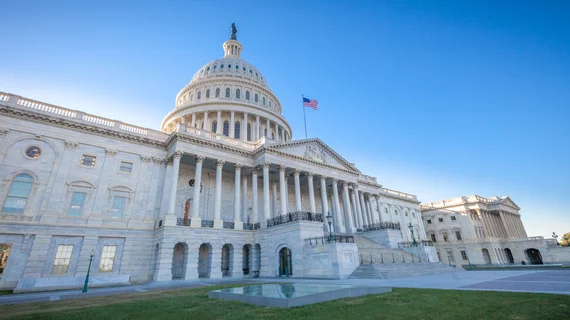Lawmakers pressure congressional leaders to fix clinical labor update set to stifle radiologist pay
Lawmakers on Monday pressed House Speaker Nancy Pelosi to address forthcoming changes in the Medicare fee schedule they say will reduce access to interventional radiology services.
Led by Rep. Bobby Rush, D-Ill., representatives want the House to block looming pay updates for clinical labor staffers. Advocates have said these changes would necessitate “massive” pay reductions, with interventional radiologists and radiation oncologists bearing the brunt. The services most impacted by this decision are used to treat diseases that disproportionately affect patients of color.
“It is clear that any benefits of proceeding with the clinical labor policy at this time are far outweighed by the significantly negative impacts on [physician fee schedule] specialists, which will exacerbate health inequity, drive further health system consolidation, and undermine specialty care,” Rush and 24 other members of Congress wrote Dec. 6. “In short, these cuts will harm our nation’s most vulnerable patients and should not be allowed to be implemented.
Rush and bipartisan members of the House previously introduced the Medicare Stability for Patients and Providers Act to address this issue in November. The Centers for Medicare & Medicaid services is aiming to update wages for clinical labor staffers such as mammography technologists. But these practice expense components are subject to budget neutrality, meaning increased Medicare spending in one place necessitates cuts elsewhere. As such, interventional radiology and other specialties with high medical supply costs and lower spending on clinical labor positions could face significant reimbursement reductions next year as severe as 20%.
The letter writers admitted that fundamental reform is needed in the Medicare program. However, they “strongly” urged Pelosi to include language in the end-of-year spending package, directing CMS not to proceed with the clinical labor update. Radiologists scored a minor victory in the final fee schedule released last month, with the agency phasing-in such changes over a four-year period.
A coalition of provider groups, including the Society of Interventional Radiology, urged Congress to pass the Rush bill on Dec. 2.
“As these combined cuts are phased-in over the next four years, they will do lasting damage to specialty providers under the PFS, accelerate health system consolidation, and further undermine the Part A trust fund as patients are forced to move to higher cost sites of service,” SIR and others said in a statement.

